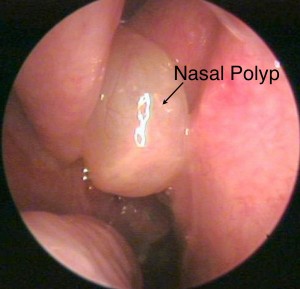Nasal polyps are noncancerous growths in the nasal passages and sinuses that can cause congestion, breathing difficulty, and recurrent sinus infections. Treatment typically begins with medications such as steroid nasal sprays, oral steroids, or injections to reduce inflammation and shrink polyps. When medications are ineffective or polyps are large, a minimally invasive nasal polypectomy may be recommended. Ongoing follow-up care and lifestyle changes—such as avoiding allergens, managing asthma, and using saline rinses—help reduce symptoms and lower the risk of recurrence.
How are Nasal Polyps Treated?
Nasal polyps treatment can involve medications, surgery, or lifestyle changes. Once your ENT has evaluated your symptoms and determined that you have nasal polyps, you and your doctor can build a comprehensive plan to treat the condition. Therefore, you’ll need to keep your follow-up appointments because treatment for nasal polyps is typically ongoing.
Medication as Nasal Polyps Treatment
Physicians often begin nasal polyps treatment with steroid nose sprays, oral pills or injections. Oftentimes, medications can reduce the inflammation in the nasal passages and sinuses, which can, in turn, shrink polyp size and alleviate congestion. Prescription medications for nasal polyps can include:
- Nasal spray steroid medications to reduce the size of polyps and relieve congestion
- Budesonide (Rhinocort)
- Fluticasone (Flonase, Veramyst)
- Mometasone (Nasonex)
- Oral or injection steroid, if nasal sprays are not effective
- Prednisone
- Medication to treat coexisting conditions
- Antibiotic for bacterial sinus infection
- Antifungal for fungal sinus infection
- Antihistamine for allergies
Nasal Polypectomy Surgery
If a patient has large or numerous polyps or medications have not helped, an ENT provider will suggest surgery. Polyp removal surgery is called polypectomy. During a nasal polypectomy, the provider will first give the patient a general or local anesthetic. The ENT doctor will then insert an endoscope through the nose to view the nasal and sinus passages. The doctor can then use micro-instruments (also inserted through the nose) to remove the polyps and open the nasal passages.
Nasal polypectomy may be the ideal solution for many patients; however, at times, polyps can return requiring repeat surgeries. Fortunately, the procedure is short, well-tolerated, and minimally invasive. Therefore, patients usually are able to return home within a couple of hours after a polypectomy. Many patients find they are congested for a few weeks, but some patients report immediate relief. There are risks of nosebleeds and bruising after the surgery. However, the doctor does not make any external incisions during the procedure.
If you have had a nasal polypectomy, you will typically have a two-week recovery period. While you are recovering, your doctor will ask you to avoid:
- Smoking
- Being exposed to second-hand smoke
- Drinking alcohol
- Being around people who are sick
- Being exposed to environmental allergens
- Engaging in strenuous activity
- Blowing your nose
Lifestyle Changes
Sometimes, lifestyle habits and environmental allergens can worsen nasal polyp symptoms. Therefore, making habitual changes, managing concurrent conditions, and avoiding particular triggers may help those who suffer from nasal polyposis. If you have polyps, try these methods for relief:
- Avoid environmental allergens
- Quit smoking
- Keep asthma under control
- Use a saline nasal rinse
- Wash hands frequently
- Stand in a steamy shower with menthol, mint, or eucalyptus oil
- Keep a humidifier by your desk or bed
- Consume foods rich in zinc, magnesium, and omega-3s
- Avoid food allergens
Although nasal polyps treatment can be challenging, with help from a knowledgeable and experienced specialist, you can find relief. Our physicians here at Fort Worth ENT & Sinus are here to help. To make an appointment with one of our ear, nose, and throat specialists, call 817-332-8848 or request an appointment online today.
Frequently Asked Questions
Nasal polyps typically do not disappear without intervention. Small polyps may remain stable for a long time, but they can gradually grow and worsen symptoms like congestion and sinus infections. Early treatment with medications or lifestyle adjustments can help control inflammation and slow polyp growth.
Steroid nasal sprays usually take a few weeks to several months to show noticeable improvement. Oral steroids may work faster, often within a few days to a week, but are generally used for the short term due to side effects. Consistent use and follow-up with your ENT are important for the best results.
Yes, nasal polypectomies are generally safe and minimally invasive. Most patients recover within 1–2 weeks. Common temporary side effects include congestion, mild bleeding, or bruising. Rare risks include infection, changes in sense of smell, or recurrence of polyps, which may require additional treatment.
While lifestyle changes cannot completely prevent nasal polyps, they reduce inflammation and trigger exposure, which can lower the chance of recurrence. Avoiding allergens, quitting smoking, managing asthma, and using saline rinses are all helpful strategies for long-term symptom control.
If you experience persistent nasal congestion, reduced sense of smell, recurring sinus infections, or difficulty breathing through your nose, it’s time to consult an ENT. Early evaluation can lead to effective treatment and prevent complications or polyp growth that might require surgery.


